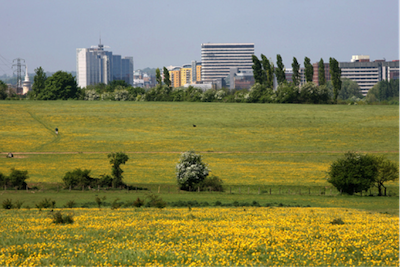Basingstoke: Local Partnerships for Sustainable Growth with URBACT
Edited on
09 October 2017What is the recipe for positioning medium-sized cities in the transforming European landscape and ensuring their sustainable economic growth? Basingstoke and 7 other partner cities in ESIMeC have come together in an URBACT network on sustainable growth for medium-sized cities, and explored the issue with a special focus on employment and skills.

ESIMeC - Economic Strategies and Innovation in Medium-sized Cities
- Aims: ESIMeC is to develop innovative economic strategies that capitalise on the assets and specificities of medium sized cities to ensure they are better equipped to cope with economic downturns and to encourage faster economic recovery as well as long term economic growth and resilience.
- Partners cities : Basingstoke and Deane (UK), Albacete (ES) Besançon (FR), Bistrița (RO), Cherbourg (FR), Debrecen (HU), Gävle (SE), Sabadell (ES)
- Timeframe : Nov 2009 - Dec 2012
Basingstoke and Deane (population 165,000) is a local government district and borough in South East England. Its primary settlement is the mid-sized city of Basingstoke, an ancient market town often mistaken for a new town (that is, a city planned and built after the Second World War as a remedy to overcrowding). Strategically situated in a major transportation hub and close to London, Basingstoke is a thriving business destination. In the last 50 years, the city built a solid reputation as an economic centre for leading technologies, attracting international investors in areas such as ICT, automobile, and drug manufacturing industries. For years, unemployment rates were close to zero.
The crisis as an opportunity for cities to rethink their future
However, the financial crisis that has been hitting Europe since 2008 has paid its toll also on Basingstoke. Rapidly, unemployment rates increased significantly; albeit still low in comparison to other cities, they were enough to set off the city’s alarm bells. The young were particularly affected, and many relocated elsewhere in the country to find employment. At the same time, shortages in high-qualified profiles caused posts to stay vacant for months: the common mislabelling of Basingstoke as a “dorm town” did not help improving the attractiveness of the city. Basingstoke’s future was at stake. “Times of crisis gave us the opportunity to think about reshaping our future” says Daniel Garnier, lead partner of ESIMeC for Basingstoke. Basingstoke had been growing so fast for so long that never had local stakeholders needed to stop and think how to make this growth sustainable. From the crisis, emerged the need to reflect on what components, in the economic fabric of the city, were successfully at work and which ones had to be improved. A long-term strategy for growth was needed. Basingstoke was not alone in its woes: the whole European tissue of medium-sized cities was showing symptoms of a similar illness, to a greater or lesser extent. Everywhere across the continent, private headquarters located in mid-sized cities were facing the risk of being closed and decentralized in larger metropolitan areas. Qualified and high value employment was declining; competition was fierce. In 2009, the English city was contacted by Besançon, a mid-sized city in Eastern France experiencing a similar situation. Soon other partners joined the debate: Albacete and Sabadell in Spain, Debrecen in Hungary, Gävle in Sweden and Bistrita in Romania. Each of the partner cities had their unique features, but they all shared the same concerns and willingness to come together, join forces and expertise to build a pathway to recovery. The ESIMeC network was set up in the framework of the URBACT 2nd call for proposals in 2009.
Reviewing local challenges and redefining priorities
The first step towards finding solutions is to correctly identify the nature of the problem. URBACT partners have to take this step when going through the “baseline exercise” requested in the development phase. Doing so with the support of the network expert, Basingstoke identified three core issues to address: increasing and diversifying Basingstoke’s industries; addressing the skill mismatch between education and training opportunities available in Basingstoke and the needs of the local labour market; making the city more attractive to businesses. The baseline also highlighted that despite a solid tradition of partnership working within the municipality, initiatives in this respect were scattered, and intelligence and data were not shared effectively. Each stakeholder – be it the local government, education and training providers, businesses or employment services – had developed rich and detailed data but never had all partners put in common their expertise. Duplication of efforts was common, initiatives were overlapping. It became clear that processes needed to be optimized with a view to make local long-term planning more efficient and effective, partnership needed to be strengthened and the stakeholders’ circle enlarged. What is more, a holistic longer-term vision for the city was lacking. “Since everything seemed to work, we never really took the time to stop and look at the whole picture”, Daniel acknowledges. During the development phase of the network already, efforts were then undertaken to set up the URBACT Local Support Group (USLG) of Basingstoke as a highly inclusive stakeholders’ group with a wide range of stakeholders bringing diverse expertise and knowledge. Working together, they were able to define priorities and identify solutions that the local authority did not have on its radar, whether because they had not thought about them or because they believed they did not have the expertise or means to address. Sue Riley, Chief Executive, Basingstoke Consortium underlines: “Educational charity Basingstoke Consortium has benefitted from its engagement in the ESIMeC project on a number of levels. In particular, the project created a focus for discussion that brought previously unconnected organisations together for a core purpose. Such partnerships usually take years to develop, but in the ESIMEC project, thanks to concrete focus and objectives – e.g. the “Careers fair” or the Employment and Skills Zone - the right organisations could be involved at the right time.”  www.basingview.co.uk
www.basingview.co.uk
Learning from EU partners on… local partnerships
The transnational networking activities that took place during the implementation phase of ESIMeC provided insightful inspiration to Basingstoke. In a series of thematic seminars, high-profile local experts and practitioners shared their city’s good practices for fostering growth building on local partnerships.
While each city has a unique way of dealing with local planning depending on their history, their socio-economic features, and their culture, some practices have a strong transferability potential.
In particular, three practices had a direct relevance for Basingstoke, namely Cherbourg’s integrated approach to skills forecasting and training; Gävle’s Convention Bureau; and Sabadell’s approach to business support.
Cherbourg offered Basingstoke an interesting example of how to track and forecast needs in specialised workforce demand and supply. The French city’s experiences with job fairs and enlarged partnership with business representatives, job centres and training providers led Basingstoke to set up a similar skills and employment partnership. A mapping was carried out to single out duplication of efforts and to identify areas for complementary actions. A directory of services was generated to help match the demand with the supply side and to link education to work, backed with quantitative and qualitative data. The results were incorporated into ESIMeC skills forecasting tool, whose goal is to help city practitioners on their journey to a job rich recovery and growth.
Basingstoke has a chronic shortage of young engineers; to remedy this situation, awareness-raising initiatives were undertaken in local schools to get young people excited about engineering.
Engineering is not boring! the "TeenTech" initiative.
To engage and motivate high school students to pursue carreers in Engineering and Technology, an awareness-raising initiative called "TeenTech" was created. Designed by schools and businesses, the event gives students an opportunity to try out real engineering in action and showcase their talents. Surveys conducted before and after the event show that the event is effective in fighting prejudices against carreers in technology.
More information about TeenTech is available at : www.teentechevent.com
Gävle’s Convention Bureau is a non-profit organization in charge of marketing a positive image of the city as a business destination. This was also an issue for Basingstoke, although it turned out more tricky to develop in the local context. “We are still working on it!” says Daniel Garnier. From the Spanish city of Sabadell, Basingstoke learned the importance of integrating skills and training components into business support services. Basingstoke also shared their own good practices with their ESIMeC partners. “Working in partnership is something we are good at. This strong tradition has been an inspiration for some cities that had little or no experience with participatory decision making”.
URBACT, the recipe for success
This mix of international and local inputs is the added value of URBACT. In particular, Daniel highlights that in the case of ESIMeC, the activities to be developed at the local level for the production of the Local Action Plan were paramount to ensure the success of the project: “it keeps it real with the local stakeholders to have the project anchored in our local situation and partnership tradition”. The URBACT Method, when it does not lead to the creation of new local partnerships, enhances the existing ones. “ESIMeC has proved to our local community that what is needed is an effective local partnership in action, that it is flexible and adaptable to provide for all needs”.
The transnational dimension of the project was highly appreciated by local stakeholders involved in the URBACT Local Support Group. Tim Colman, Businessman and Chair of the Federation of Small Businesses for Hampshire and Isle of Wight stresses: “From the point of view of the owner of a small business in Basingstoke and as chair of the Federation of Small Businesses, I have to consider the ESIMeC project a great success! It has provided a fantastic opportunity to see how medium sized cities across Europe are engaging with the business community in spite of very difficult economic times. We touched on so many important subjects from business support to skills development and the importance of sector-specific programmes. Working with European partners has helped us work better on a local level”.
The lessons learned through transnational exchanges and the URBACT Method were of great value when Basingstoke’s local support group worked on their challenges. Basingstoke’s action plan focused on the design on a flagship project, the regeneration of “Basing View”, a business park that was crippled by its dated infrastructure and needed further developed. This regeneration project should be the most important commercial regeneration the town has had in the last 20 years. The opportunities to make a difference to the town’s economy through this project are multiple and long-term, with the redevelopment expected to last about 15 years.
Forstering smart growth: the regeneration of Basing View
The regeneration of Basing View is a major long term project that is expected to take at least 10 to 15 years.
The planned vision for Basing View will include a mix of new office space; a business class hotel; and other supporting facilities to ensure Basing View is a first class destination. It it envisaged that the project has the potential to double the current number of jobs currently available in the business park to around 10,000. A master plan for Basing View has been developed and will guide the development of the park over the coming years.
For more information on Basing View, visit www.basingview.co.uk
Basing View is becoming a reality: the first bricks have been laid during the Summer 2013. Daniel is confident that the regeneration will work through: “Three years on, after many exchanges of good practice and learning, we can’t say we have solved all our problems and challenges but we have certainly made some headway in finding new or better ways of tackling skills and workforce development issues”. He believes “URBACT is a special EU Programme because it is designed to make you think long-term before you act, which is exactly what we needed. Now our Local Support Group has regained confidence in how to approach the future”.
URBACT PILOT DELIVERY NETWORKS
Together with EVUE and ROMA-Net, ESIMeC project was selected among the 3 delivery networks that will test city co-operation though URBACT into the (delivery) implementation phase of their projects. The challenge for the cities involved in these networks is how to maintain the sustainability and the integration (two main characteristics for URBACT action plans), through the implementation phase. Or otherwise said, how to make sure at all times that the actions taking place integrate the economic, social and environmental dimensions.
Read more:
ESIMeC project – URBACT website
ESIMECT 2 project - URBACT website
Basingstoke Local Action Plan - ![]() Download Basingstoke_-_LAP_summary_-_30.09.12.pdf (1023.84 KB)
Download Basingstoke_-_LAP_summary_-_30.09.12.pdf (1023.84 KB)
ESIMeC skills forecasting manual and tool - ![]() Download ESIMeC Skills Forecasting Manual (1.31 MB)
Download ESIMeC Skills Forecasting Manual (1.31 MB)
ESIMeC “Cookbook – recipes for demand-led work-force development” - ![]() Download ESIMeC Cookbook (6.37 MB)
Download ESIMeC Cookbook (6.37 MB)
 Submitted by URBACT on
Submitted by URBACT on
